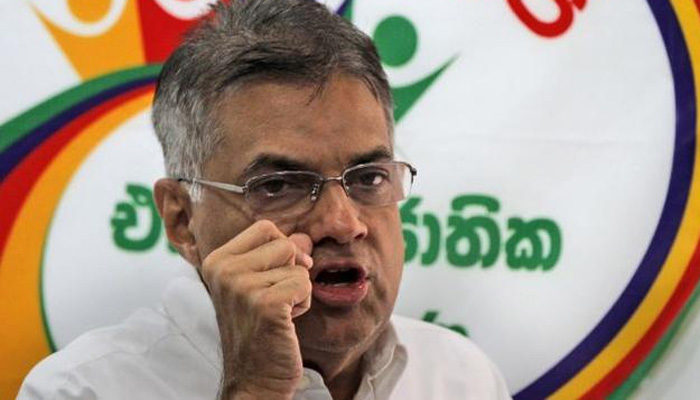
The Sri Lankan parliamentary poll results have shown that the voters have rejected divisive politics and authoritarianism by electing Ranil Wickremesinghe. The message is the defeat of former President Mahinda Rajapakse rather than the victory of the UNP-led coalition. Rajapakse’s bid for a return despite his humiliating defeat in the Presidential elections has been foiled. However voters have not given a decisive mandate to the UNP-led coalition.
Wickremesinge has formed his government with the country’s two major political parties – formerly bitter rivals – agreeing to work together in the new parliament. If this experiment works it will be a hopeful sign in tackling the country’s most pressing challenges -national reconciliation after a long and brutal civil war and overcoming economic hardships. Wickremesinghe has promised a “new Sri Lanka in 60 months” which will focus on the economy, and on fighting corruption, ensuring freedom for all, creating infrastructure and improving the education system.
The new government faces many challenges. The first is to provide a stable administration. Will the new coalition experiment of the UNP and Sri Lankan Freedom Party succeed? There are bound to be some pulls and pressures. The Tamil National Alliance has not attended the swearing-in ceremony of Wickremesinghe. Going by the support of the Sinhalese voters to Rajapakse, his brand of politics is still alive and might pose a challenge for undertaking bold reofrms. Rajapakse has decided to sit in the opposition and might create mishcief.
The second is the minority question. The new government should not miss the chance of finding a solution to this contentious issue. How will Wickremesinghe deal with the Tamils and Buddhists? The TNA, by winning 16 seats in the recent polls, has had its hands strengthened not just in negotiations with Colombo but also with respect to other political forces that have criticized the TNA for not pursuing hardline nationalist politics.
The TNA has fully supported the BNP as it had supported Maithripala Sirisena in the presidential elections eight months ago. The Tamil question has been dogging the country for decades now and they are looking for some solution. Will the new dispensation be able to engage with the minorities? What would be the formula for devolution of powers to the Tamils? How will the new government deal with the Sinhala Buddhist nationalist party, the Jathika Hela Urumaya (JHU), which is part of the UNP coalition? The Sirisena-Wickremesinghe duo should not miss this opportunity of coming up with out-of-box thinking to satisfy the minorities.
The third challenge will come after the UN Human Rights Commission releases its report next month of human rights violations during the Eelam War 4, which is expected to report abuses on both sides. There is need to set up a credible enquiry commission to satisfy all parties and also the international players. But the new government will face a major challenge in balancing complex domestic and external political pressures with the release of the report.
The fourth is corruption. The Sirisena government in the past eight months had made some attempts clean things up but it could not go the whole hog. For instance, establishing a Financial Crimes Investigation Division (FCID) was a bold step
Will the new government investigate the financial irregulaties allegedly committed by Rajapkse, his family and friends and if so to what extent will it go?
The fifth is a balancing act between India and China. Wickremesinghe is pro-India if you go by his statement to the media soon after the victory that “It’s a new chapter in Sri Lankan politics itself. Therefore, we should have close relations with India.” There is all possibility of enhanced cooperation between New Delhi and Colombo as India is more sympthaetic and supportive of the new government. It is faced with addressing India’s concerns such as the fisehrmen issue, the return of Sri Lankan refugees in Tamil Nadu as also implementatin of the 13th amendment plus.
The sixth is that there is the huge task of reconciliation and rehabilitation ahead as war wounds are not fully healed. The Sirisena government had taken some steps like removing the governor who was at loggerheads with the elected chief minister of the Northern Province, CV Wigneswaran. But the CM wants autonomy, land and police powers and removal of military forces form the area. One of the steps taken was the setting up of a reconciliation office headed by former President Kumaratunga.
The seventh issue is the economy which is not in good shape. The Wickremesinghe victory has raised hopes of speeding up reforms and fuelling faster economic growth. The poll outcome was also in line with the market expectations. The new government has to take long-pending decisions to improve liquidity and broaden the overall market.
Last but not least the constitutional reforms need to be addressed. It is indeed a good thing that the government is in a posiiton to undertake reforms although the Rajapakse faction will try to oppose every piece of legislation.
The new government has a chance to take the war weary country forward and India should support all its efforts to deal with the eocnomy and seucity aspects . Wickremesinghe has a lot good will from India as well as the west and with his right of the centre policies he should not miss this golden opportunity.
(The Statesman)